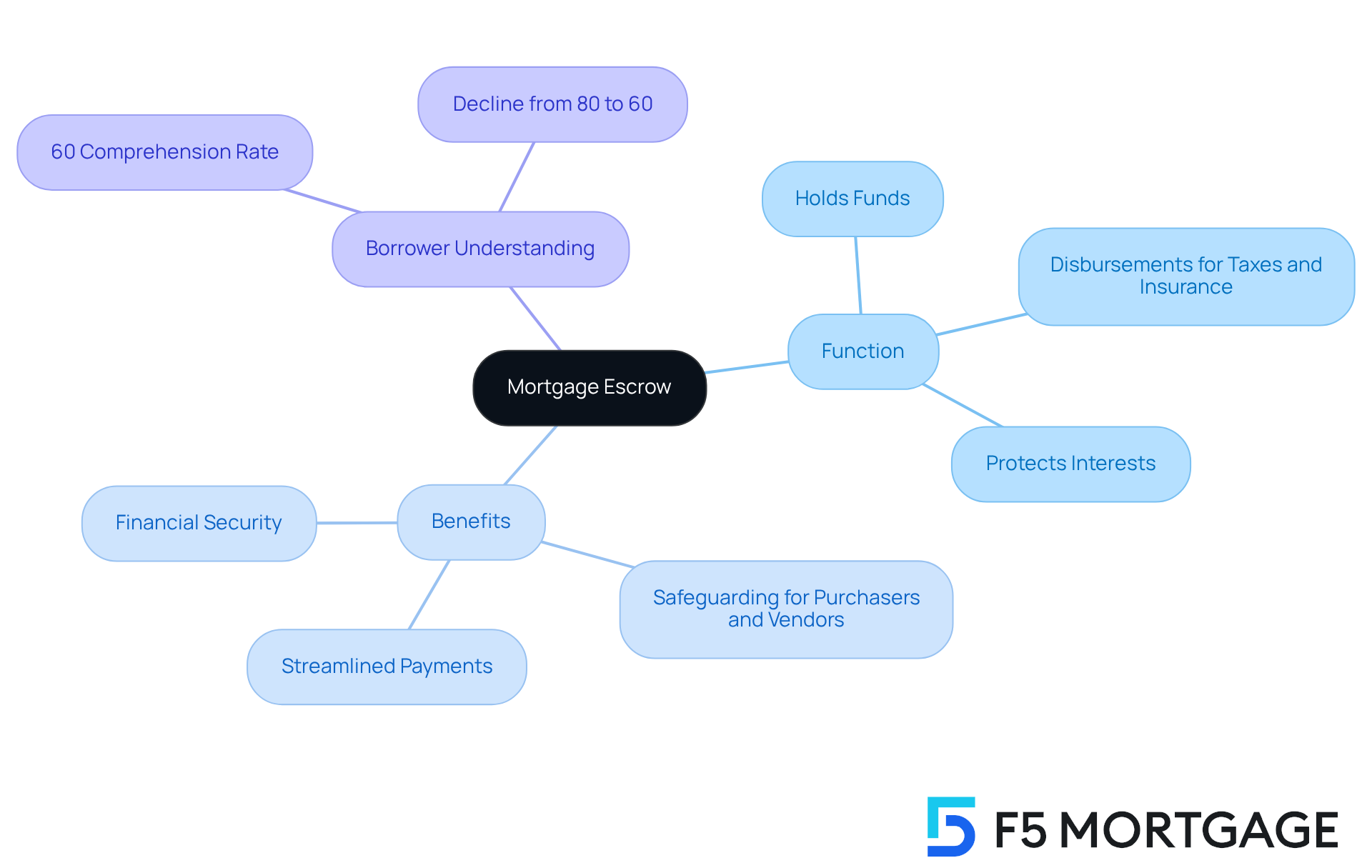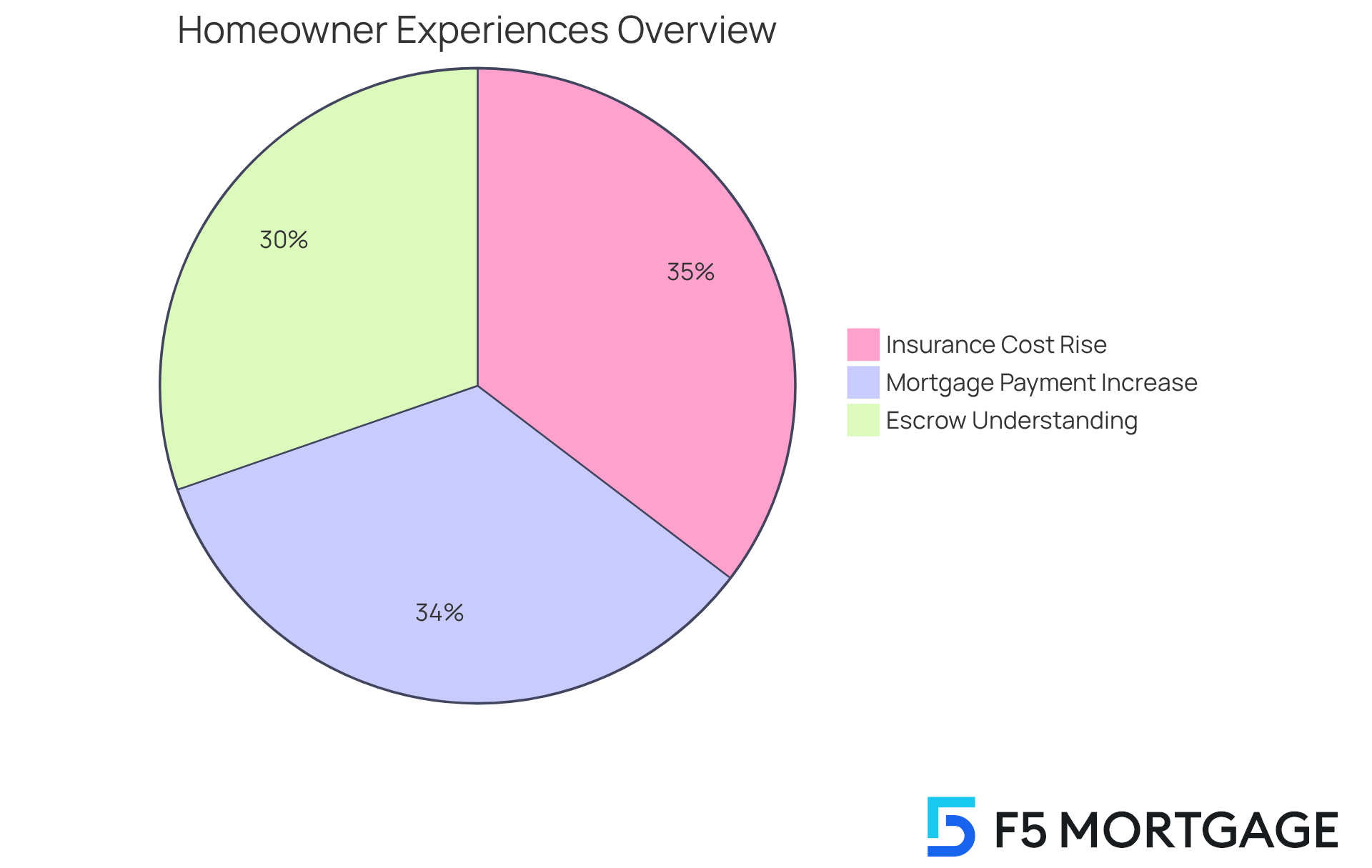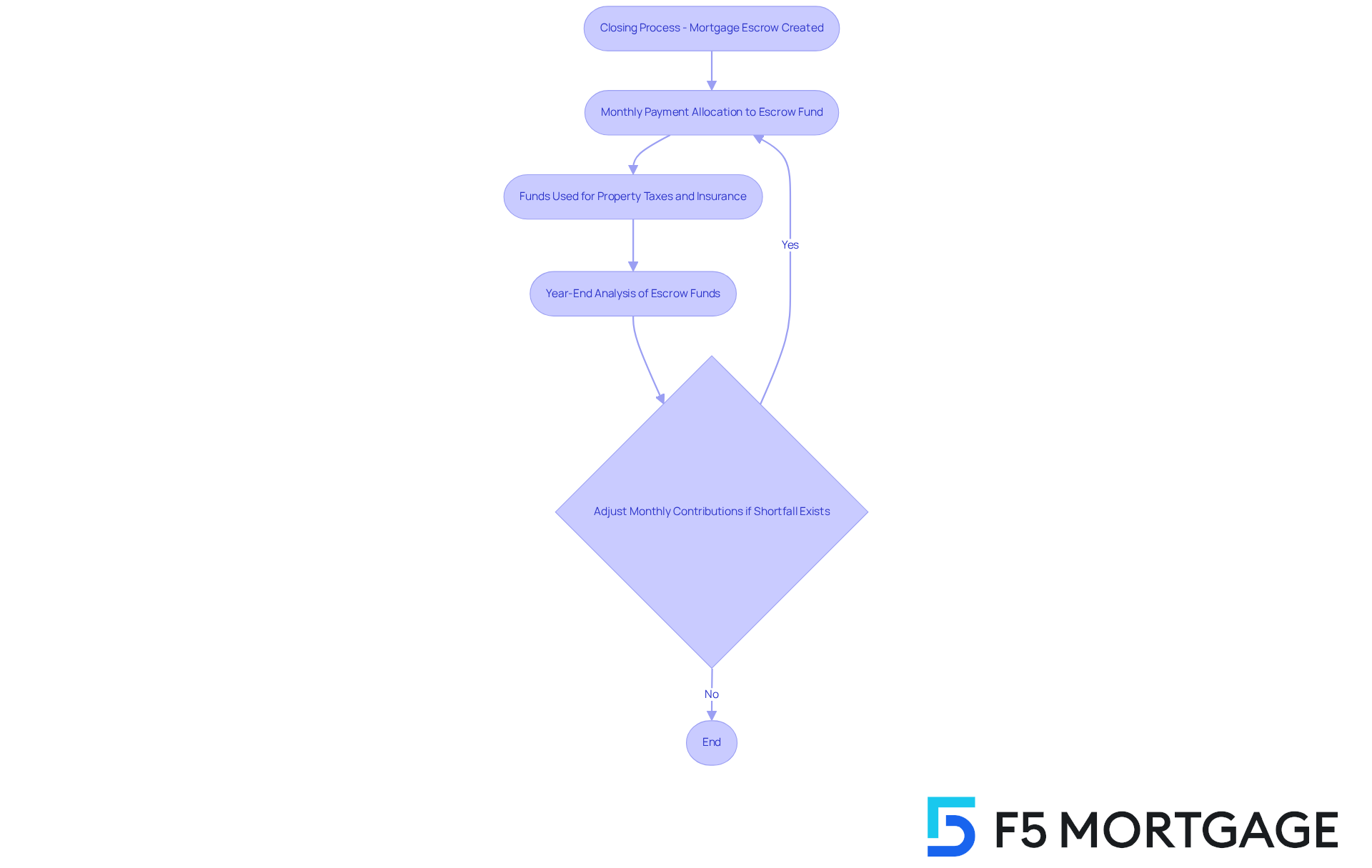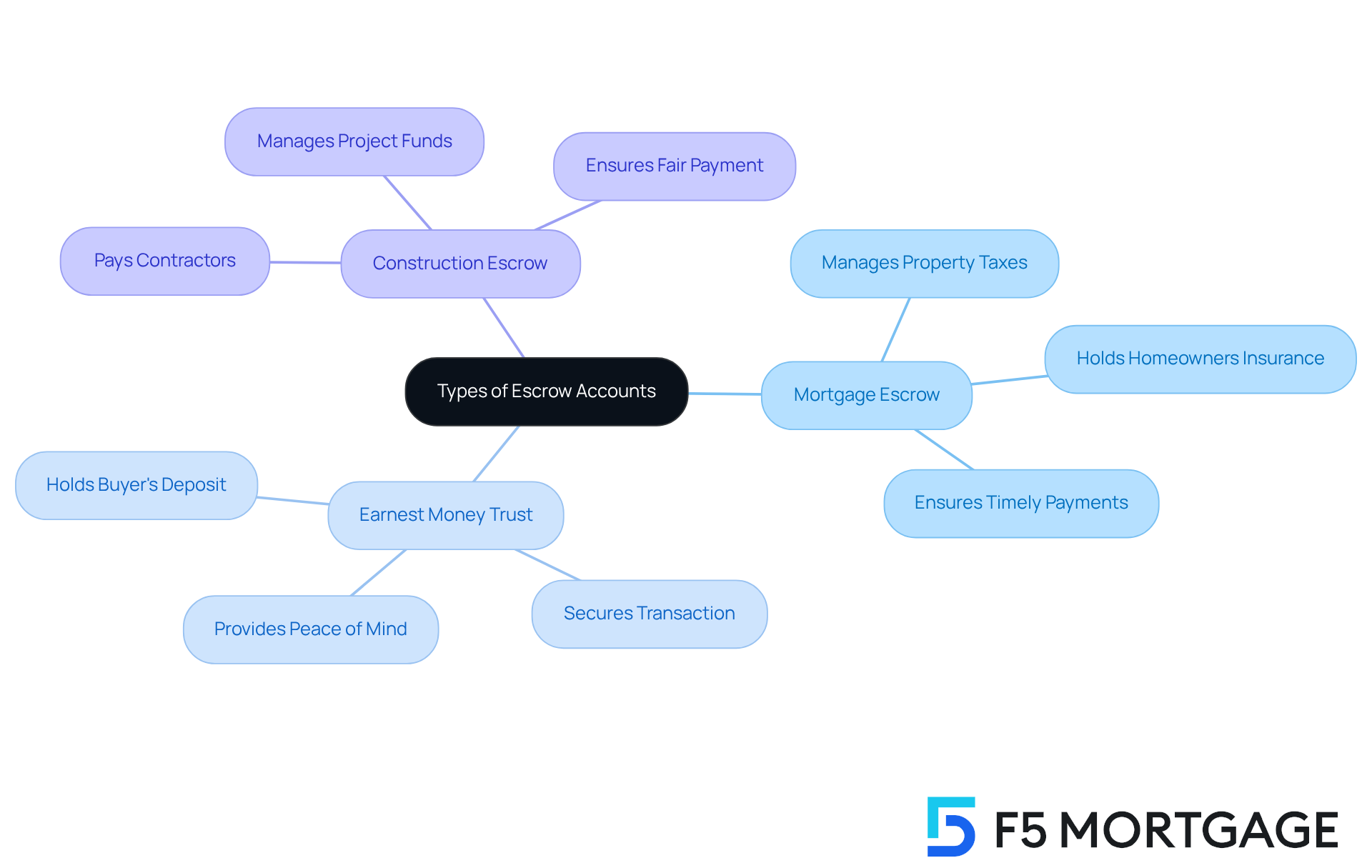Overview
Mortgage escrow is a financial arrangement where a neutral third party holds funds to manage payments for property taxes and insurance during a real estate transaction. This ensures timely disbursements, protecting both buyers and lenders. We understand how challenging this process can be, and it’s important to recognize the benefits of mortgage escrow. It streamlines payments and provides financial security, allowing families to focus on their new home.
However, we’re noticing a concerning decline in borrowers’ understanding of how escrow functions. This highlights the need for better education on the topic. By empowering ourselves with knowledge, we can navigate the mortgage process more confidently. We’re here to support you every step of the way, ensuring that you feel secure and informed in your decisions.
Introduction
Navigating the home buying process can be overwhelming, and understanding the intricacies of mortgage escrow is essential for your journey. This financial arrangement not only simplifies payments for property taxes and insurance but also safeguards the interests of both buyers and lenders. We know how challenging this can be, especially when faced with so much information.
However, despite its significance, a concerning decline in borrower comprehension about escrow accounts raises questions about their true understanding. What are the implications of this knowledge gap? It’s crucial to recognize that this gap can lead to confusion and potentially costly mistakes.
So, how can you empower yourself to make informed decisions regarding your financial responsibilities? By taking the time to educate yourself about escrow accounts, you can gain confidence in managing your mortgage. We’re here to support you every step of the way as you navigate this important aspect of homeownership.
Define Mortgage Escrow: Understanding the Basics
Mortgage trust is a financial arrangement where a neutral third party holds funds on behalf of the buyer and seller during a real estate transaction. Typically set up by the lender at closing, the mortgage escrow fund oversees disbursements for property taxes, property insurance, and occasionally mortgage insurance. The main function of a trust fund is to ensure prompt transactions, protecting the interests of both the lender and the homeowner. We know how challenging navigating these processes can be, and it’s important to note that F5 Mortgage does not service loans; payments will be made to the lender that services the loan.
As of 2025, around 80% of borrowers use trust funds. This is a necessity for conventional loans with less than 20% equity and for FHA-insured loans, regardless of equity. This extensive application highlights the critical role that mortgage escrow plays in the mortgage process.
Key benefits of mortgage escrow accounts include:
- Streamlined Payments: Escrow accounts simplify the payment process, allowing homeowners to manage their financial obligations more effectively.
- Safeguarding for Purchasers and Vendors: By ensuring that crucial transactions are completed promptly, trust funds shield both parties in a deal. For instance, if a buyer’s property taxes are not paid, it could lead to tax liens, jeopardizing the investment.
- Financial Security: Escrow funds assist in avoiding unforeseen financial pressures by distributing costs throughout the year, facilitating budgeting for homeowners.
Understanding how trust funds function is essential for home purchasers. Unfortunately, recent surveys indicate a decline in comprehension of mortgage escrow, with only 60% of borrowers fully grasping its function, down from nearly 80% a year ago. We’re here to support you every step of the way, highlighting the need for better education on the topic.
In conclusion, mortgage trust funds serve an essential function in safeguarding the interests of all parties engaged in a real estate deal, ensuring that important disbursements are made timely and effectively. If you have any questions regarding your loan and payment processes post-closing, please don’t hesitate to reach out to F5 Mortgage. We’re here to help you navigate this journey.

Explore the Role of Escrow in Home Financing
In residential financing, escrow funds play a vital role in protecting lenders while also supporting property owners. We understand how challenging it can be to manage these responsibilities. These funds ensure that property taxes and insurance premiums are paid on time, which is crucial since unpaid taxes can lead to liens against the property, putting the lender’s investment at risk. For instance, 70% of participants have experienced a rise in their property insurance costs, highlighting the importance of timely payments to avoid financial strain.
Moreover, trust accounts help families plan for these expenses by incorporating them into monthly mortgage payments. This arrangement simplifies financial management for property owners, providing peace of mind as they know that essential costs are being handled by a trustworthy third party. In fact, 68% of property owners have noticed an increase in their monthly mortgage payments over the past two years due to rising property taxes and insurance costs, underscoring the need for effective fund management.
Additionally, trust funds can positively influence mortgage default rates. By ensuring that critical payments are made, they lower the risk of foreclosure, benefiting both lenders and property owners. This dual protection reinforces the importance of understanding how mortgage escrow funds operate. However, only 60% of homeowners with such funds fully comprehend their purpose, a decline from nearly 80% the previous year. As the landscape of home financing evolves, grasping the nuances of trust arrangements will be essential for maintaining financial stability. We’re here to support you every step of the way.

Explain How Escrow Accounts Work in Practice
Starting a mortgage can feel overwhelming, but understanding the process can ease your worries. When you begin, lenders create a mortgage escrow during the closing process. Each month, a portion of your mortgage payment is allocated to the mortgage escrow fund. These funds are utilized by the lender to cover your property taxes and insurance premiums through mortgage escrow as they come due. Typically, homeowners contribute one-twelfth of their annual property tax and insurance costs into a mortgage escrow each month, making budgeting more manageable.
At the end of the year, lenders perform an analysis of the mortgage escrow to ensure that the funds are adequate for upcoming expenses. If there’s a shortfall, you may need to adjust your monthly contributions to your mortgage escrow to keep the fund well-supported. This organized approach not only helps you meet your financial obligations but also alleviates the stress of juggling multiple payments, such as those involved in mortgage escrow. We understand how challenging this can be, and for many, having a mortgage escrow fund simplifies the experience of homeownership. It provides peace of mind knowing that essential payments, including those related to mortgage escrow, are handled promptly.

Identify Types of Escrow Accounts and Their Components
Navigating the world of trust funds can feel overwhelming, but understanding the different types can make a significant difference. One of the most common types is the mortgage escrow, which helps manage property taxes and homeowners insurance. This fund is essential for ensuring that your financial responsibilities are met without stress.
Another important type is the earnest money trust. This account holds the buyer’s deposit securely until the transaction is finalized, providing peace of mind during the home-buying process. Additionally, there are construction escrow funds designed to manage resources for home building projects. These funds ensure that contractors are paid fairly as work progresses, protecting both your investment and their efforts.
Each of these accounts plays a vital role in facilitating transactions and safeguarding the interests of everyone involved. By understanding these types of trust funds, you can navigate your financial responsibilities more effectively and feel more confident in your journey. Remember, we’re here to support you every step of the way.

Conclusion
Mortgage escrow is a vital part of real estate transactions, acting as a protective mechanism that ensures financial responsibilities are managed effectively and securely. By engaging a neutral third party to oversee essential payments, homebuyers and lenders can navigate the complexities of property ownership with greater ease and confidence.
Throughout this article, we’ve shared important insights into the functions and benefits of mortgage escrow accounts. These accounts streamline payments and safeguard against financial pitfalls, playing an integral role in the home financing process. However, we know how challenging this can be, especially with the decline in borrowers’ understanding of escrow. This highlights the urgent need for improved education on this essential topic, as knowledge is crucial for making informed financial decisions.
Ultimately, understanding the importance of mortgage escrow can significantly enhance your homebuying experience, fostering financial stability and peace of mind. We encourage homebuyers to take proactive steps in learning about their escrow accounts and to seek guidance when needed. This will ensure that you are well-equipped to manage your financial obligations effectively. The journey to homeownership can be complex, but with the right knowledge and support, it can also be a rewarding endeavor.
Frequently Asked Questions
What is mortgage escrow?
Mortgage escrow is a financial arrangement where a neutral third party holds funds on behalf of the buyer and seller during a real estate transaction, typically set up by the lender at closing. It oversees disbursements for property taxes, property insurance, and occasionally mortgage insurance.
Why is mortgage escrow important?
Mortgage escrow is important because it ensures prompt transactions, protecting the interests of both the lender and the homeowner. It helps facilitate the smooth completion of crucial transactions in a real estate deal.
Who services the loans associated with mortgage escrow?
F5 Mortgage does not service loans; payments will be made to the lender that services the loan.
What percentage of borrowers use mortgage escrow as of 2025?
As of 2025, around 80% of borrowers use mortgage escrow accounts.
Who is required to use mortgage escrow accounts?
Mortgage escrow accounts are a necessity for borrowers with conventional loans that have less than 20% equity and for FHA-insured loans, regardless of equity.
What are the key benefits of mortgage escrow accounts?
The key benefits of mortgage escrow accounts include streamlined payments, safeguarding for purchasers and vendors, and financial security by distributing costs throughout the year.
How do escrow accounts help homeowners manage their finances?
Escrow accounts simplify the payment process, allowing homeowners to manage their financial obligations more effectively and avoid unforeseen financial pressures.
What recent trend has been observed regarding borrowers’ understanding of mortgage escrow?
Recent surveys indicate a decline in understanding of mortgage escrow, with only 60% of borrowers fully grasping its function, down from nearly 80% a year ago.
How can borrowers get support regarding their loan and payment processes post-closing?
Borrowers can reach out to F5 Mortgage for support and assistance in navigating their loan and payment processes after closing.








